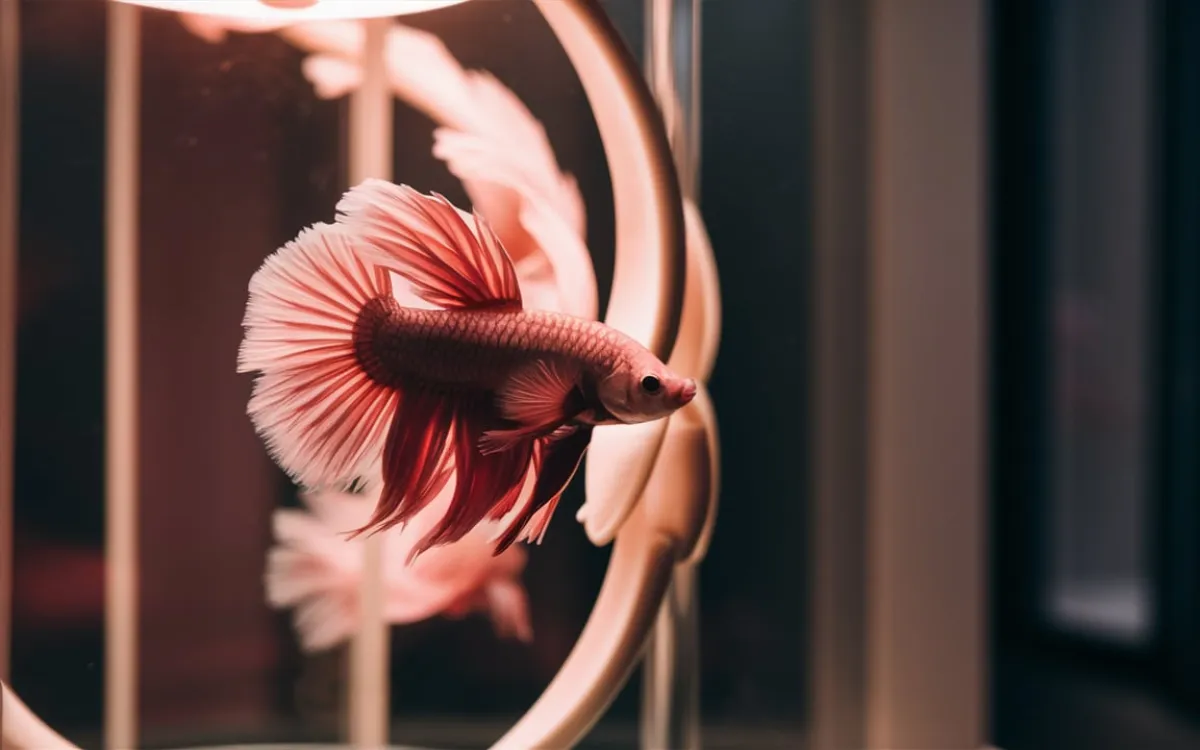Are betta fish nocturnal? While these vibrant fish are known for their active personalities during the day, many wonder if they’re nocturnal. The answer, however, isn’t as straightforward as you might think.
Discover the fascinating truth about betta sleep patterns and learn how to create the perfect environment for your finned friend to rest and recharge. Let’s find out with Betta Fish Information now!
Do Betta Fish Sleep?
You know that feeling of being so tired you could sleep through an earthquake? Well, bettas aren’t built for that kind of slumber. They’re light sleepers, and for good reason!
Imagine being a tiny betta fish in the wild. A heavy sleep could mean becoming a snack for a larger fish or a bird swooping down. Or, even worse, another betta could take over your territory while you snooze!
That’s why bettas are incredibly alert, waking up at the slightest movement or sound. It’s their survival instinct in action.
These days, most bettas are bred in captivity. Their ancestors, generations back, never faced the dangers of the wild. But even though your pet betta might never encounter a predator, their light sleep is a legacy of their wild past, a reminder of the constant vigilance they needed to survive.
Are Betta Fish Nocturnal? Debunking The Fact

The answer is a bit more nuanced than a simple yes or no.
Betta fish are primarily diurnal, meaning they are most active during daylight hours. They’re most alert and energetic when the sun is up, showcasing their vibrant colors and engaging in their usual activities like swimming, exploring, and interacting with their environment.
However, bettas don’t sleep like we do. They enter a resting state at night, becoming less active, their movements slow down, and their respiration rate decreases. This resting state is essential for their well-being and allows them to conserve energy.
So, are they nocturnal? Not exactly. While they are most active during the day, they do exhibit some nocturnal activity. This is particularly true for younger bettas, who may be more active at night as they explore their surroundings. However, as they mature, they typically become more active during the day.
How Do Betta Fish Behave at Night?
Betta fish, while known for their vibrant personalities during the day, are primarily diurnal, meaning they are most active during daylight hours. At night, they enter a resting state, becoming less active, their movements slow down, and their respiration rate decreases. While not truly nocturnal, they do exhibit some nocturnal activity, particularly younger bettas who are still exploring their surroundings.
Here’s a breakdown of their nighttime behavior:
- Resting: Often found resting on the bottom of the tank, nestled in plants or under driftwood.
- Minimal Movement: Movements are slower and less frequent than during the day.
- Hiding: They might prefer to hide in their favorite hiding spots at night.
- Reduced Respiration: Their breathing slows down as they enter their resting state.
It’s important to remember that every betta is an individual, and their behavior can be influenced by age, personality, and environment.
Do Betta Fish Sleep During the Day?
While bettas are primarily active during the day, they can take short naps throughout the day. These naps are usually brief and may involve resting on the bottom of the tank or hiding in a plant.
Think of it like a human taking a power nap. Betta fish might not sleep for long periods during the day, but they might need a quick rest to recharge their energy levels.
Here are some signs that your betta might be taking a nap:
- Reduced movement: They might be less active and their movements might be slower.
- Resting position: They might be resting on the bottom of the tank, lying on their side, or hiding in a plant.
- Slowed breathing: Their breathing might become slower and more shallow.
If you see your betta exhibiting these behaviors, it’s likely they’re taking a short nap. There’s no need to worry, as this is a normal part of their daily routine.
How to create an optimal environment for Betta sleep
Creating a comfortable sleep environment for your betta fish is essential for their well-being. Here’s how to do it:
Dim the Lights: Gradually dim the lights in their tank a few hours before bedtime to avoid disrupting their sleep cycle.
Provide Hiding Places: Offer caves, dense plants, or driftwood for your betta to feel secure while resting.
Maintain Water Quality: Perform regular water changes and ensure the filter is working properly to keep the water clean.
Minimize Disturbances: Keep the area around the tank quiet and peaceful, avoiding loud noises or sudden movements.
Consider a Night Light (Optional): A low-level nightlight can provide a sense of security for some bettas.
Observe Your Betta’s Behavior: Pay attention to your betta’s nighttime behavior to ensure they are comfortable and getting enough rest.
By creating a peaceful and restful environment, you can help your betta get the sleep they need to stay healthy and happy!
Conclusion
While bettas might not be strictly nocturnal, understanding their sleep patterns and creating a comfortable environment for them to rest is crucial for their well-being. By providing a dimly lit tank, hiding places, and clean water, you can ensure your betta gets the rest they need to stay healthy and happy.
Remember, every betta is an individual, so observe their behavior and adjust their environment accordingly to create the perfect sleep haven for your finned friend.

Related Posts
Platinum Butterfly Koi: A Stunning Addition to Your Pond
What Are The Most Expensive Betta Fish? Factors Influencing
Rare Beautiful Betta Fish: Types, Care & Where to Find Them